

COVID-19 is especially harsh on elderly people, and researchers think they know why. WHO-China study on COVID-19 origin says transmission from bats to humans via another animal 'very likely' A joint WHO-China study on the origins of COVID-19 says that transmission of the virus from bats to humans through another animal is the most likely scenario.
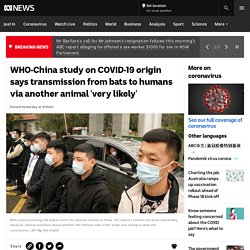
Key points: The Associated Press says it has obtained a draft copy of the report that outlines the study's findingsOverall, the findings are largely as expected and left many questions unansweredThe report found transmission to humans from bats though through a second animal was "likely" to "very likely" A lab leak of the virus is also "extremely unlikely", according to a draft copy of the report, obtained by The Associated Press. Overall, the findings are largely as expected and left many questions unanswered.
The team proposed further research in every area, except the lab leak hypothesis. The report's release has been repeatedly delayed, raising questions about whether the Chinese side of the study was trying to skew the conclusions to prevent blame for the pandemic falling on China. Hand dryers can circulate germs through the air. Why are they still used everywhere? Airborne contaminants, dirty toilet seats, mould and mildew: long before the coronavirus pandemic came around, the hygiene-focused among us knew public washrooms are grimy places.
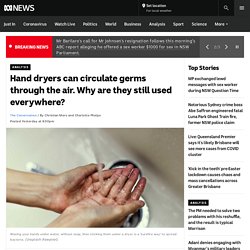
Most adults visit the bathroom around 8-10 times a day. With an average hand-drying time of 30 seconds, we could expect between 4-5 minutes of daily dryer use per person (and more for people with an overactive bladder or similar disorders). In an attempt to facilitate the hand washing process, are hand dryers adding to the filth by blowing contaminants around? And if so, why are they still common? Canberra researchers at the Australian National University find a protein that could stop allergic reactions and anaphylaxis.
Thousands of people live with allergies and autoimmune diseases, and that number is only rising, for reasons that are not entirely clear to medical researchers.
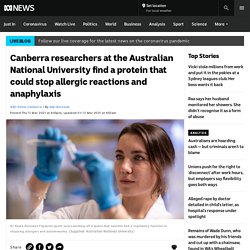
Key points: ANU researchers have identified neuritin as the body's natural defence against allergic reactionsIt has the potential to tackle numerous conditions, including autoimmune diseases and asthmaThe researchers hope to develop better treatments than EpiPens or ventolin For many, a sudden asthma attack, or a tiny amount of a seemingly harmless substance like peanuts, can be fatal without timely intervention from things like inhalers or EpiPens. But researchers at the Australian National University (ANU) in Canberra believe they are a significant step closer to creating better treatments for people with debilitating allergies.
They have made the "exciting" discovery of a protein they say prevents the human body from developing not just allergies, but autoimmune diseases and asthma as well. "It is an incredible discovery. " Researchers return to find out fate of children involved in landmark FASD study. Ten years after a groundbreaking study revealed record-high rates of FASD in outback Australia, researchers have returned to the Kimberley to see how the children are coping in adulthood.
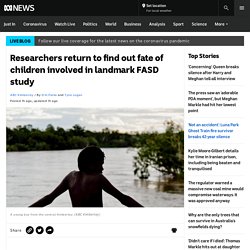
Key points: A 2009 study was one of the first in Australia to provide firm figures around the rates of children impaired by their mother's drinking during pregnancyThere are concerns support is still limited for families living with FASD in regional and remote areasThe 10-year follow-up study will look at the long-term impacts of FASD, and gaps in services and supports In 2009, a generation of young children in the Fitzroy Valley communities were assessed for fetal alcohol spectrum disorder (FASD). It was found one in eight children had physical and mental impairments linked to their mother's alcohol consumption during pregnancy — one of the highest rates recorded among the handful of studies that have been done. Health concerns. Premature baby's critical surgery cancelled due to budget cuts at Adelaide hospital, mother says.
Critical surgery for a baby's life-threatening condition had to be cancelled at the eleventh hour because the Women's and Children's Hospital in Adelaide did not have the budget to staff an intensive care bed for the infant, her mother says.
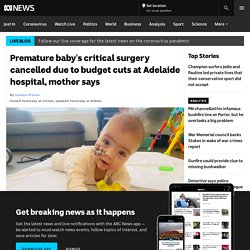
Key points: Ten-month-old Willow was born premature and has ongoing health issuesShe has been stuck in hospital for five weeks waiting for surgeryHer mother says it was cancelled due to budget cuts at the hospital Emma Bone's 10-month-old daughter Willow was born at 28 weeks and has ongoing health issues, including being fed through a tube. "Her problem is she aspirates her fluid, so it sits in her lungs and causes her to stop breathing which she sort of does on a daily basis, she goes unconscious, she goes blue, she goes floppy," Ms Bone told ABC Radio Adelaide. Johnson & Johnson loses pelvic mesh court appeal. The Federal Court has dismissed an appeal against a landmark judgment awarding $2.6 million to Australian women with faulty vaginal mesh implants.
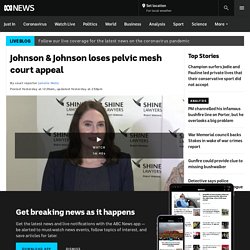
Key points: Johnson & Johnson were appealing a decision to award damages to three womenBut three judges upheld the decision which saw vaginal mesh recipients awarded millionsMore than 10,000 women have joined the class action, the lead lawyer said. In March last year, drug company Johnson & Johnson and subsidiaries were ordered to pay damages to three women with faulty mesh implants: Kathryn Gill, Diane Dawson and Ann Sanders.
They were the lead applicants in a class action of thousands of women with serious side effects from the implants, including chronic pain and infection. The devices, also known as transvaginal mesh, were implanted into the pelvis for conditions that included pelvis organ prolapse and stress urinary incontinence. Johnson & Johnson loses pelvic mesh court appeal. Anti-vaccination protesters chant 'my body, my choice' at rallies ahead of coronavirus jab rollout. Several thousand people have joined anti-vaccination protests across Australia, ahead of the country rolling out its coronavirus inoculation program next week.
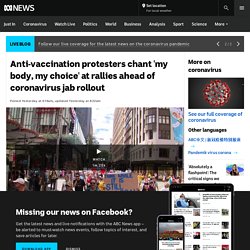
Key points: Thousands of people join anti-vaccination protests in capital cities around AustraliaPolice arrest several people in MelbourneAustralia's COVID-19 vaccination rollout is set to begin on Monday The protests, organised by Australian vs The Agenda, were largely peaceful but police made several arrests in Melbourne.
New health star rating system ranks fruit juice below diet cola in shift to sugar-based grading. Food regulators have classed fruit juice as less healthy than diet cola under new guidelines confirming Australian health star ratings (HSR) on food packaging will focus more on sugar content.
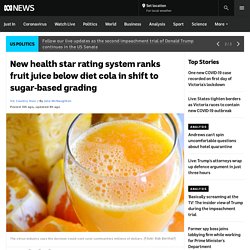
Key points: After a review of Australia's health star rating system, fruit juice will have a lower rank than diet colaAgriculture sector says the decision is "madness" and will devastate fruit growersDieticians say fruit juice is high in sugar but has more nutrients than soft drinks Friday's decision by the Australian and New Zealand Ministerial Forum on Food Regulation, made up of state and territory ministers, will reduce the five-star rating for fruit juice to as low as two stars.
Humble aquarium fish helps Melbourne scientists discover how to reverse muscle trauma. Melbourne scientists say they have found a way to harness the power of stem cells and make them regenerate muscle, in a discovery that could offer hope for muscular dystrophy sufferers, the elderly and people with muscular limb damage.
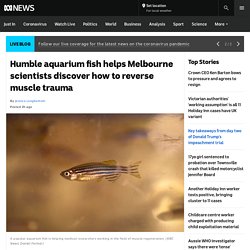
Monash researchers found that a fish protein stimulates stem cells that accelerate muscle repairThey say the speed and extent of the repairs haven't been seen beforeClinical trials are at least two years away, but researchers hope the discovery will change lives By isolating a naturally occurring protein created in the body, they have been able to completely reverse what were thought to be irreparable muscle injuries in some animals, and are hopeful the treatment will work on humans as well. Although it has long been known that stem cells drive the repair of muscles after an injury, growing them in a lab setting and then artificially applying them to muscle injuries has not worked.
"[The macrophage] was loving the stem cell," Professor Currie said. Three-year research project to probe whether drones have role in remote NT health delivery. People living in remote Aboriginal communities could begin to receive critical health supplies by drone before the end of the year as part of a new research project in the Northern Territory.
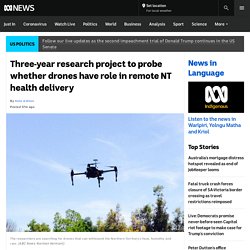
Key points: The drones could fly health supplies to communities cut off during the wet seasonResearchers are hoping to start deliveries before the end of this year The drones will be not used to deliver COVID-19 vaccines as part of the trial The three-year trial aims to find out if using drones to deliver loads of up to 25 kilograms as far as 250 kilometres away is a practical and cost-effective way to improve healthcare services for remote Territorians.
"It's the next step in medicine," Health Minister Natasha Fyles said. NT Health will contribute $1.4 million over three years to the project, in partnership with Charles Darwin University and transport research centre iMove Australia. Trial faces regulatory hurdles Hoping to fly by the end of the dry season. Shark, ray populations have declined by 'alarming' 70 per cent since 1970s, study finds. Shark and ray populations have declined by around 70 per cent since the 1970s, according to research published today in Nature. Key points: Oceanic shark and ray populations have declined around 70 per cent since the 1970s, the study in Nature foundResearchers attribute the decline to overfishingScientists say more strict management measures are needed to bring populations back to viable levels A team of researchers from countries including the UK, Canada, and Australia looked at data from 18 shark and ray species, measuring their abundance as well as where they sat on the list of threatened species.
One of the study's authors, Cassandra Rigby from James Cook University, said the research, supported by the Shark Conservation Fund, showed an "alarming" decline over the past 50 years. "They have a key role in the marine ecosystems, and if you remove them, their ecosystem starts to shift, and it can have really negative consequences for all fishes in the ocean.
" Tapeworm, vertigo and pancreatitis drugs are being trialled as COVID-19 treatments. With COVID-19 vaccines on their way, it's time to breathe a sigh of relief right? Well, maybe not. Key points: Australian researchers are involved in clinical trials to investigate repurposing existing medications to treat COVID-19It includes drugs to treat tapeworm, pancreatitis, vertigo and cancerExperts warn clinical trials don't always translate into effective human treatments As experts have explained, a vaccine isn't the only thing that will help end the pandemic. Most vaccines aren't 100 per cent effective and it's not likely we will achieve full coverage in the community. And, since it will be still many months before the majority of the population will be vaccinated, it is still important to have effective treatments for COVID-19. Nordic walking, the strange Scandinavian sport helping people overcome injury. Kristen Pratt was working in her Geneva office one day when she looked out the window and saw something that she found both surprising and amusing.
A group of people were walking along with poles, almost as if they were cross-country skiing without snow. What started out as mere curiosity that day, however, developed into a passion she has now shared with hundreds of others. 'It was too good to be true' Nordic walking is widely practiced in Scandinavia and other European countries, including Germany, but little known in Australia. Ms Pratt believes the sport is the key for many people becoming active again. "To be honest, I looked out my window and burst out laughing when I saw these people," she said. "But then I found out a bit about it and just thought it was too good to be true. " From Belgium to Coonalpyn, migrant couple's 'wild ride' story of success in land Down Under. In her 20 years of living in Australia Claudia Ati-Touati has never had to travel far to see the country. Instead, it has come to her. Truck drivers, work commuters, intrepid travellers — they all stop at her Waffles & Jaffles shop on the Dukes Highway connecting Adelaide and Melbourne.
It is hard to miss the shop with its red, yellow and black flags, bicycle decor and the Belgian-Dutch infused Aussie slang coming from behind the counter. Canberra man does DIY surgery after waiting years for medical help. Health professionals warn Australia is struggling to deal with post-COVID-19 medication shortage. Australians with chronic health conditions are having to take drastic stop-gap measures because of a continuing medication shortage, medical specialists say. Key points: Australia has recorded 12 million COVID tests and we're the envy of the world. At some point this week, Australia will perform its 12 millionth COVID-19 test. The equivalent of nearly half the population will have been tested since January 2020 — it is an incredible feat. Australia's current position of having effectively suppressed the virus to intermittent outbreaks owes much to the year-long dedication and ingenuity of 35,000 pathologists, medical scientists, lab technicians, couriers, phlebotomists and ancillary personnel, who've worked tirelessly every day to keep us safe.
Doctors call for change to 'inherently unfair' Medicare watchdog amid fears patients put at risk. A lone Queensland GP is taking the Federal Government to court over a Medicare watchdog system that she says is creating extreme confusion and anxiety for doctors and will ultimately put patients at risk. Key points: The Professional Services Review Scheme (PSR) is designed to weed out doctors rorting MedicareThe PSR is a system that has been problematic for more than a decade, the AMA saysThe Federal Health Department says it could not comment on the issue until the court matter is resolved. Adelaide family explores clinical drug trials overseas to access treatment for toddler's rare cancer. It's not the best time to be travelling internationally but, for the parents of an Adelaide toddler battling a rare form of cancer, going overseas is a necessity they might not be able to avoid.
Northern Territory senator Malarndirri McCarthy says it's 'beyond time' for NT to make its own laws on assisted dying. All four of the Northern Territory's federally elected members want the NT to be able to make its own laws on assisted dying, but a bill passed by the Commonwealth in 1997 is still preventing them from doing so. Phage therapy offers hope in fight against antibiotic resistance and superbugs. Fishing for samples from a raw sewage pond isn't terribly pleasant work, but Ruby Lin hopes what she collects here will help avert a medical catastrophe. Sepsis survivor's ordeal prompts Tasmanian call for coordinated approach to deadly disease. It was a minor medical procedure on a Friday afternoon that changed Shelley Brooks' life forever. New $160,000 drug for multiple myeloma blood cancer to be added to PBS at a cost to patients of $480. More than 1,000 patients with an incurable type of blood cancer are expected to benefit from a "completely new" treatment that will be subsidised by the Federal Government in the new year.
Cooroy hospital robotic rehab program uses virtual-reality technology to help stroke patients. After I was bitten by tick, I developed a rare allergy to meat. Now I'm a quasi-vegetarian. Venomous snake bites three-year-old Lucia Carna, prompting first-aid lesson warning. We don't expect newborns to have cataracts, but looking for warning signs can save a child's sight. Australian study finds COVID-19 'long haulers' suffer symptoms months after coronavirus infection. Asbestos victim with mesothelioma from home renovations beats James Hardie liability appeal. Australian managing partner of McKinsey regrets consultancy's role during opioid epidemic. Family of psychology student who slipped through cracks of Victoria's mental health system wants reform. Immunotherapy helps Gold Coast woman outlive terminal cancer diagnosis. NT Government admits delay releasing problem gambling report.
Sports dietitians concerned over energy deficiency in elite athletes. Vaping laws could be about to change, making it illegal to import nicotine fluid. Women speak out against controversial religious Sydney drug and alcohol rehabilitation centre the Healing House - ABC News. Medicare can be inefficient and rewards providers for performing unnecessary services, according to most comprehensive review in almost 40 years - ABC News.
Melanoma patient Stuart Taylor told he is unlikely to live until Christmas - ABC News. Kombo is more than just South Sudanese meal. For some in Melbourne, it's been a lifeline - ABC News. Australian study shows wastewater testing can detect coronavirus weeks before people show symptoms - ABC News. Mental health system in 'crisis' as youth referrals jump by 50 per cent in five years - ABC News. Watch how the coronavirus can spread in an office. Parole board chair says NT Government cuts will worsen Aboriginal incarceration rates - ABC News. How many drinks can I have a day? Can I drink when I'm breastfeeding? Here's what the new alcohol guidelines say - ABC News.
Need mental health help? Your suburb could determine if you can get it. Mystery illness in India leaves hundreds sick, but it's not COVID-19 - ABC News. Sharp rise in RSV infections among children has experts warning parents not to relax COVID-19 social distancing measures - ABC News. Health Minister among those concerned as NT Government cuts funding to parole rehab program - ABC News. COVID patient with sepsis makes 'remarkable' recovery following megadose of vitamin C - ABC News. Tasmanians more likely to have low vitamin D levels during COVID-19 pandemic - ABC News. Juice industry in damage control after health star rating changed to rank lower than diet cola - ABC News.
Japan's aged care facilities remain locked down amid a COVID-19 third wave, and now there are fears residents may develop dementia - ABC News. We're in the middle of the coronavirus pandemic, so why are people still 'soldiering on' at work? - ABC News. Coronavirus lockdowns contributing to faster deterioration in dementia patients, research finds - ABC News. Mould in newly built Perth home blamed for family's rashes, joint pain and headaches - ABC News. Physiotherapist, chiropractor, osteopath and myotherapist: what's the difference and which one should I visit? - ABC News. Ice Bucket Challenge co-creator Patrick Quinn dies at 37 from motor neurone disease - ABC News.
For many with endometriosis, depression and gut problems are nothing new. But a study has now found a genetic link - ABC News. Mick O'Dowd's body had an extreme response to an infection. Sepsis turned him into a quadruple amputee - ABC News. Jade Tunchy opens up about HPV diagnosis and motivates women to stop putting off cervical cancer tests - ABC News. Orange juice health star rating proposal provokes outcry from citrus industry - ABC News. When Lucy O'Flaherty took up shoemaking she didn't know it was part of her heritage - ABC News.